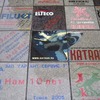Russia failing to win drink battle
(THE GUARDIAN, LONDON) Perfume, brake fluid, de-icer, meths, toilet cleaner, nail varnish remover ... "I drank them all," Boris Kuznetsov said. "Everything that burns."
Like many Russian alcoholics, the 53-year-old former laser specialist from a top Moscow physics institute slithered into his darkest drinking days during the turmoil of perestroika.
An estimated 500,000 Russians die each year from alcohol-related causes, a figure that covers about 30 percent of all male deaths. Vodka and other hard spirits remain the drink of choice, taking up three-quarters of official consumption.
Holidays such as new year and Orthodox Christmas, which occurred Saturday, are a traditional time for mammoth benders, or "drinking without drying out." Bottles of vodka are regularly downed around kitchen tables. All too often, poverty and stress push hard drinking over the edge into alcoholism.
With the help of a 12-step recovery programme, Kuznetsov is now in control of his illness. Yet millions remain trapped by the disease and new research suggests worrying trends in consumption.
Taxation on alcohol is low and production of over-proof moonshine vodka called samogon is rife -- an estimated four bottles are drunk in the countryside for every licensed one.
There is a rising scepticism about the common methods of treating alcoholics. Most state clinics rely on "coding," a method invented by the Soviet psychiatrist Alexander Dovzhenko. Hypnosis or suggestion are used to scare patients into believing they will die or be permanently injured if they drink again.
For many it is a swift, brutal and rarely effective over a long period. "They gabble something at you, make a woo-woo sound in your ears and then tell you your testicles will fall off if you touch a drop," said Aleksei, a middle-aged alcoholic who has been coded several times. "It never worked for me."
Some doctors argue in favour of coding because it is occasionally successful, and inexpensive. "There's been a lot of black PR for coding recently saying it's inhumane and
dangerous but I think it's scaremongering by companies that sell cure-all pills," said the head of one state narcology clinic.
Alexander Nemtsov, one of the country's leading experts on alcoholism, is doubtful. "Coding worked to an extent on the Soviet person because he was suggestible," the professor from Moscow's state scientific and research institute of psychiatry said. "Now, as we become more sceptical, like people in the West, it's less and less effective."
Back on the rails, Kuznetsov thinks only long-term group therapy can wean a person off drink for good. "Without that I would never have managed."
However, Alcohol Anonymous has fewer than 300 groups in the country and only a few state clinics provide similar programs.
 Podium
Podium





